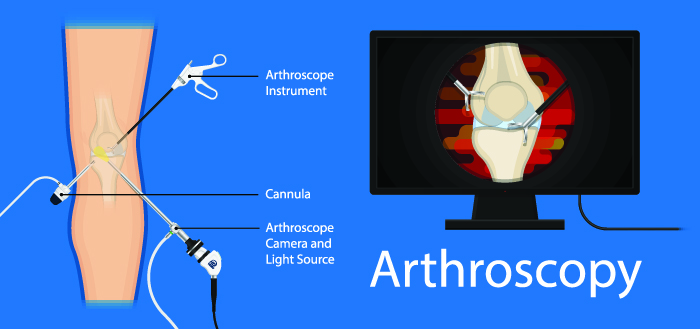Knee Arthroscopy Surgery in Kondapur, Hyderabad
Knee arthroscopy is a surgery performed at Apollo Kondapur for diagnosing and treating knee joint problems. During the procedure, the surgeon inserts a tiny camera called an arthroscope into the knee through a small incision. Through this, they are able to see the inside of your joint on a monitor. By getting a clear view, they are able to investigate the problem and correct the issue by using small instruments.
Through this procedure, doctors can diagnose many knee problems like misaligned patella (kneecap) or a torn meniscus. The surgery can also be used for repairing the ligaments of the joint. Even though there are certain risks to the procedure, the outlook is good in most cases. Your prognosis and recovery time will depend on how severe your knee problem is and how complex the procedure is.

What are the Causes?
If you have been experiencing knee pain, your doctor might recommend a knee arthroscopy procedure for you. They might have diagnosed the condition that is causing you pain or they might perform the arthroscopy procedure to get a diagnosis. In both cases, this procedure is a useful way of confirming the source of knee pain and treating the problem. Here are some of the knee injuries that can be diagnosed and treated through arthroscopic surgery:
- Posterior cruciate or torn anterior ligaments
- Torn meniscus (cartilage present between the bones)
- Displaced patella
- Torn cartilage pieces that are loose
- Removing Baker’s cyst
- Swollen synovium (lining in the joint)
- Fracture in the knee
How to Prepare for the Knee Arthroscopy?
Your doctor will give you some pre-surgery instructions. Make sure that you tell them about any over-the-counter or prescribed medications or supplements you are taking. You will have to stop taking medicines like ibuprofen or aspirin a couple of days or weeks before your surgery. Also, you should stop drinking or eating anything for at least 6 to 12 hours before the procedure. In some cases, the doctor might prescribe you pain medications for any pain or discomfort you experience after the arthroscopy.
What is the Procedure?
Before the procedure begins, your doctor will administer you an anaesthetic. This might be local (numbs only the knees), regional (numbs everything from the waist down), and general (puts you to sleep). If you are not administered general anaesthesia, you will be up during the procedure and can watch the procedure on the screen.
The doctor will start by making small cuts or incisions in your knee. Sterile saline or salt water will be pumped in for expanding your knee. This way, it will be easier for the doctor to get a view inside your joint. Then, they will enter the arthroscope through one of the incisions. Using the camera attached to the arthroscope, the doctor will take a look around your joint. The images will be produced on the monitor present in the operating room. Once the surgeon has located your knee problem, they might insert small tools through the incisions for correcting the issue. Lastly, they will drain the saline and stitch the incisions.
What are the Risks?
There are certain risks associated with knee arthroscopy, though they are very rare:
- Excessive bleeding
- Infection
- Allergic reaction to any medication or anaesthesia administered during the procedure
- Breathing difficulties because of anaesthesia
- Formation of a blood clot
- Damage or injury to the ligaments, cartilage, blood vessels, meniscus, or nerves of the knee
- Stiffness in the knee
Request an appointment at Apollo Spectra Hospitals, Kondapur
Call 1860-500-2244 to book an appointment
Knee arthroscopy is a safe procedure. But, don’t hesitate to talk to your doctor if you have any questions.
The surgical procedure of Knee Arthroscopy is not very invasive. In most cases, it takes only an hour to finish the procedure, depending on the condition that must be treated. You will be allowed to go back home the same day. Use an ice pack on the knee as it helps minimize the pain and reduce swelling. Have someone to look after you for a few days after the procedure.
Yes, until you are able to normally use your knee, you should consult a physical therapist. They will be necessary for restoring your range of motion and strengthening your muscles.
Symptoms
Our Top Specialities
NOTICE BOARD
CONTACT US
CONTACT US
 Book Appointment
Book Appointment


.svg)
.svg)
.svg)
.svg)








